By Cheryl Oestreicher, Project Archivist, Auburn Avenue Research Library on African American Culture and History
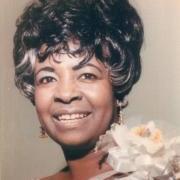 “Working for Freedom: Documenting Civil Rights Organizations” is a collaborative project between Emory University’s Manuscript, Archives and Rare Book Library, The Auburn Avenue Research Library on African American Culture and History, The Amistad Research Center at Tulane University, and The Robert W. Woodruff Library of Atlanta University Center to uncover and make available previously hidden collections documenting the Civil Rights Movement in Atlanta and New Orleans. The project is administered by the Council on Library and Information Resources with funds from the Andrew W. Mellon Foundation. Each organization regularly contributes blog posts about their progress.
“Working for Freedom: Documenting Civil Rights Organizations” is a collaborative project between Emory University’s Manuscript, Archives and Rare Book Library, The Auburn Avenue Research Library on African American Culture and History, The Amistad Research Center at Tulane University, and The Robert W. Woodruff Library of Atlanta University Center to uncover and make available previously hidden collections documenting the Civil Rights Movement in Atlanta and New Orleans. The project is administered by the Council on Library and Information Resources with funds from the Andrew W. Mellon Foundation. Each organization regularly contributes blog posts about their progress.
For more information about the collection described in this post, please contact the Archives at Auburn Avenue Research Library, aarl [dot] archives [at] fultoncountyga [dot] gov
In 1972, Jondelle Johnson became the Executive Director of the NAACP Atlanta Branch. The organization was at a transitional moment, with the major civil rights actions of the 1960s over but new initiatives not yet defined. Known as “Mrs. NAACP,” her leadership in the 1970s and 1980s helped the Branch continue established committees and initiate new programs.
Johnson was born in Charleston, South Carolina on March 11, 1924. She graduated Allen University in 1945 with honors, with a major in psychology and a minor in education. She also did some graduate work in elementary education at both Atlanta and Emory Universities. She was married to Winfred Johnson with whom she had four children. She was a member of Wheat Street Baptist Church and later Solid Rock Miracle Temple.
As an elementary school teacher, she taught kindergarten, reading, science, music, and first grade. She was the Society Editor and Managing Editor of the Atlanta Inquirer, Society Editor and Associate News Editor of the Atlanta Voice, and Southeastern Editor of Bronze America magazine. In the 1960s, her newspapers stories instigated action against policy brutality, segregation at the city prison farm hiring practices, and upgrading of postal employees.
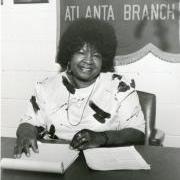 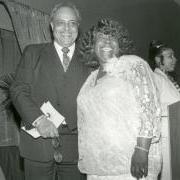 |
| Above left: Jondelle Johnson, circa 1970s. Above right: Jondelle Johnson with Benjamin Hooks, circa 1970s. Click to view full size images. |
She was involved in numerous activities, including the Atlanta children’s Theatre, Atlanta PTA, Georgia Educational Association, Atlanta Region Open Housing, National Business and Professional Women’s Club, Atlanta Urban League, United Negro College Fund, and the YWCA. She won numerous awards, including the Metro Summit Woman of the Year, Iota Phi Lambda’s Bronze Woman of the Year, Georgia State PTA Outstanding Educator’s Award, Fulton County Republican Service Award, and the National Negro Women’s Business and Professional Leadership Award.
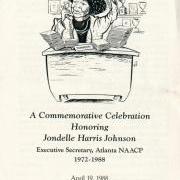  |
| Above left: Program from Jondelle Johnson Commemorative Celebration, 1988. Above right: Article by Jondelle Johnson, circa 1960s. Click to view full size images. |
Johnson’s involvement in the NAACP started as a Youth Council member in South Carolina, while her father served as president of the local branch. She served as the Atlanta Branch’s Executive Director from 1972-1988, where she implemented a job placement program, increased membership by about 300%, and turned the annual Freedom Fund dinner into a major event. The Branch also achieved victory in several lawsuits, including ones against the United States Postal Service’s main branch relocation, the Postal Credit Union’s hiring policies, and the Joint Board of Tax Assessors’ plan for a tax rollback for the affluent northside. Notably, her guidance in the landmark lawsuits against Cox Enterprises led to blacks as news anchors and other executive positions. They also worked with the FCC to divert Cox’s cable license, which broke up the Cox monopoly on Atlanta radio and television broadcasting. Her leadership was instrumental in negotiating Fair Share agreements to ensure minorities had equal participation in company’s employment and procurement. In 1989, she started the first national Radiothon membership drive, a program that continued for several years. In 1996, she instituted the NAACP Phoenix Awards to honor media, artists, and entertainers.
 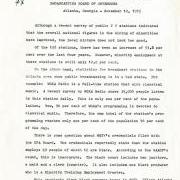 |
| Above left: Invitation to Jondelle Johnson Drive celebration, 1999. Above right: Speech, 1975. Click to view full size images. |
Jondelle Johnson’s contributions to Atlanta and national civil rights, politics, and education spanned more than four decades. In 1999, the city commemorated her legacy by dedicating a street called Johndelle Johnson Drive.
